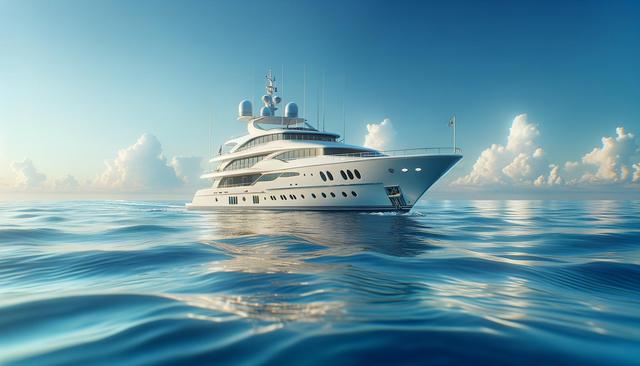Understanding Yacht Rental Options
Yacht rental services are not one-size-fits-all. The variety of options available ensures that there’s something for every type of traveler, whether you’re planning a romantic getaway, a family vacation, or a corporate retreat. The first step is identifying the type of yacht that fits your needs. Common categories include motor yachts, sailing yachts, and catamarans. Each type offers distinct features in terms of speed, stability, and onboard amenities.
Rental options also differ based on duration. Some prefer a day trip along the coastline, while others opt for week-long adventures to remote islands. When planning, consider the itinerary, number of guests, and level of crew support needed. Some rentals are fully crewed, offering a captain, chef, and deckhands, while others may be bareboat charters where you captain the vessel yourself, provided you meet licensing requirements.
Key considerations when selecting a yacht include:
- Size and layout of the boat
- Amenities such as onboard entertainment, water sports gear, and kitchen facilities
- Availability of crew and additional services
- Your sailing route and preferred destinations
Planning Your Route and Itinerary
One of the biggest advantages of a yacht rental is the flexibility it offers in planning your journey. Unlike cruise ships with fixed schedules, renting a yacht allows you to tailor your itinerary to suit your interests. Whether you’re drawn to quiet coves, bustling beach towns, or snorkeling hotspots, your route can be customized accordingly.
Popular yachting destinations often feature a mix of natural beauty, cultural sites, and marine activities. Some regions are known for their calm waters and scenic anchorages, making them ideal for beginners or families. Others offer challenging navigation and remote locations, perfect for seasoned sailors seeking adventure.
To plan an effective itinerary, consider:
- Distance between destinations and travel time
- Local weather conditions and seasonal patterns
- Permits or restrictions for certain areas
- Fuel stops and provisioning points
Working with the yacht charter company or a local skipper can help ensure your plans are both feasible and enjoyable. They can provide insights into hidden gems and help avoid common pitfalls.
Costs and Budget Considerations
Yacht rental prices can vary widely based on several factors, including the type of yacht, the season, and the duration of the charter. Understanding these variables can help you budget more effectively and avoid unexpected expenses.
Essential cost elements to account for include:
- Base charter fee (usually quoted per week)
- Fuel and docking fees
- Crew wages and gratuities
- Food and beverages
- Insurance and taxes
Some rentals offer all-inclusive packages that bundle many of these costs, while others follow a more itemized billing approach. Make sure to clarify what is and isn’t included in the quoted price before signing a contract. It’s also wise to set aside a contingency budget for unplanned activities or emergencies.
Group travel can be a cost-saving strategy. Dividing the charter fee among several people often makes yacht rental more accessible, especially for high-end vessels. Keep in mind, however, that larger groups may require bigger yachts, which come with their own cost implications.
What to Expect Onboard
The experience aboard a rented yacht can range from simple and rustic to lavish and luxurious, depending on the vessel and your preferences. Most yachts come equipped with comfortable sleeping quarters, kitchenettes or full kitchens, and outdoor lounging areas. Higher-end yachts may feature hot tubs, jet skis, or even onboard cinemas.
In crewed charters, the staff takes care of navigation, cooking, cleaning, and sometimes even entertainment. This allows guests to fully relax and enjoy the journey. On bareboat charters, guests are more involved in the sailing process, which can be part of the appeal for hands-on travelers.
To make the most of your time onboard, pack appropriately. Essentials include:
- Soft luggage for easy storage
- Non-slip shoes
- Sun protection (sunscreen, hats, sunglasses)
- Lightweight clothing and swimwear
- Waterproof bags for electronics
Most yachts provide safety equipment and basic supplies, but it’s always good to double-check with the rental provider beforehand. Some also offer extra amenities for an additional fee, such as paddleboards, scuba gear, or fishing equipment.
Booking Tips and Legalities
Booking a yacht rental involves more than just selecting a boat and setting sail. There are important legal and logistical steps that need to be addressed to ensure a smooth experience. First, always work with a reputable charter company. Reading reviews, checking certifications, and asking for references can help validate credibility.
Most charters require a signed agreement that outlines terms and conditions, including payment schedules, cancellation policies, and liability clauses. It’s essential to read this document carefully and ask questions if anything is unclear. Depending on your destination, you may also need to secure travel insurance or specific sailing permits.
When booking, consider the timing. High seasons often see increased demand and prices, so booking well in advance can secure better rates and more choices. Off-peak seasons may offer discounts, but be sure to research weather conditions and availability of services during those times.
Lastly, confirm the qualifications needed if you plan to sail the yacht yourself. Many regions require a recognized boating license or sailing resume. Without these, you will likely need to hire a certified skipper, which can add to the cost but also enhance the safety and enjoyment of your trip.




Leave a Reply